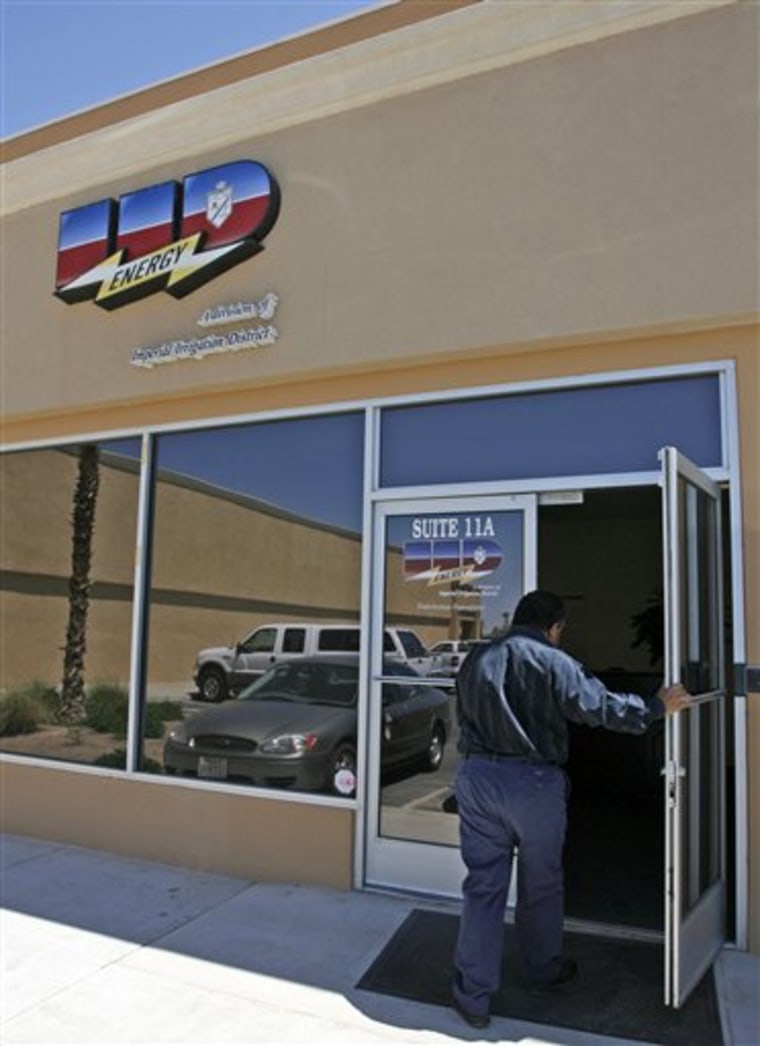From his office in a strip mall in the Southern California desert, energy trader Bill Rapp bet heavily that Hurricane Katrina would cause natural gas prices to go up and up and up.
He got it wrong — spectacularly wrong.
The gamble has led to tens of millions of dollars in losses at the utility he worked for, the Imperial Irrigation District, and resulted in higher electric bills for its 140,000 customers in this region of triple-digit temperatures and double-digit unemployment.
As for Rapp, he lost his job and went from potential hero to goat.
"We're having to pay for someone's bad decisions, for someone's mistakes," said Donna Freeman, 60, who pays $300 a month to cool her small home.
Rapp vehemently rejects his employer's portrayal of him as a rogue operator and insists he acted at the direction of the utility board and with the knowledge of his colleagues. Either way, the mess at the relatively small utility is a lesson in the risks of buying and selling energy in an increasingly volatile market.
Rapp, 42, was responsible for buying natural gas for the utility's electrical generating plants under a new strategy to hedge against price swings.
After Hurricanes Katrina and Rita struck the Gulf Coast in August and September 2005 and knocked out natural gas plants, Rapp bought $155 million worth of gas in just four months, or enough fuel for about a year and a half, according to a consultant's report on the mess and interviews with utility officials.
Electric utilities routinely buy gas and coal well in advance. The idea is to lock in a favorable price now, in case prices go up later. But Rapp's buying of so big a supply of gas in so short a period was highly unorthodox.
Moreover, according to utility officials and the consultant's report, Rapp worked with little supervision and even made trades on his cell phone instead of on a recorded office line — a violation of company policy and a departure from industry practices.
Natural gas prices did shoot up in the first few months after Katrina, but then slid after a mild winter, and Imperial Irrigation found itself overpaying. It lost $51 million by one estimate in the consultant's report.
Several industry officials and analysts said they were unaware of any hedging losses as large as Imperial Irrigation's. They said utilities have generally adopted strong internal oversight.
The higher prices were passed along to Imperial Irrigation's customers in this struggling agricultural area of around 15 percent unemployment, and their monthly electric bills climbed about $10 on average, said John Pierre Menvielle, president of the utility's elected board. The board also had to make $20 million in budget cuts this year that included putting off the replacement of utility poles.
State and local authorities investigated and decided to bring no charges. The utility's consultant, Baker Street Group of San Diego, found no evidence anyone tried to profit personally or harm the utility.
"I don't have any doubt that he was a scapegoat," said cattleman Rod Foster, who closely followed the scandal. "There was nobody watching over him and making sure everything went together."
Rapp, in his own defense, noted that three weeks after Katrina struck, the utility board voted to aggressively expand its advance purchases of natural gas and build a two-year supply. Rapp said in an e-mail to The Associated Press that he was under orders at the time to "bring it up to speed." He defended the purchases as rational business decisions.
"Nobody made a bet here!" he wrote.
The utility said Rapp — working on a drab trading floor of about a half-dozen computer terminals at a shopping mall that now houses a Chinese restaurant and payday loan shop — spent $39 million on a single day in December 2005.
While attending a conference in San Diego the next month, he used his cell phone to buy $11.2 million in gas from BP, according to the consultant. When BP disputed the price Rapp claimed he negotiated, the utility didn't have a recording to back him up and ended up paying an extra $158,508.
The consultants also discovered that approval signatures required for trades were missing and some approval forms couldn't even be found. In addition, a panel of utility executives charged with overseeing the trades spent little time discussing how much Rapp was buying, according to meeting records.
In his first comments to a reporter since the scandal broke last year, Rapp said he was forced to use his cell phone because there was no one to fill in for him when he was out of the office. He said another employee was supposed to confirm the trade on a recorded line.
Rapp said it wasn't his job to gather signatures and keep records of trades. And he insisted that members of the oversight committee were watching.
In retrospect, there were warning signs before Katrina struck. In June 2005, accounting and consulting giant KPMG cited a litany of safeguards that were missing from the utility's hedging program.
After things went bad, Rapp said, colleagues froze him out. He stopped getting invited to meetings. Colleagues poached his best trading contacts. Rapp said he was ejected from one meeting by an employee who closed the door on his foot. In January 2007, he was suspended with pay and escorted out of his office. He was fired this spring.
He is now suing the utility, accusing it of defamation.
Rapp still lives three doors down from the utility's former general manager, Charles Hosken, who said in March 2007 that the trading venture was a "rogue operation." Rapp remembers reading his neighbor's comment in the local newspaper.
"My heart sank," he said.
Now unemployed, he spends his days shuttling his children around the Imperial Valley, a spinach-, alfalfa- and lettuce-growing area near the Mexican border about 100 miles east of San Diego.
"I think he wanted to be a hero," said Andy Horne, a former board member.
